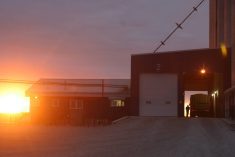Lance Bean is preparing for two large undertakings this spring: seeding and an election.
The Rouleau, Sask., farmer, who is also president of the Saskatchewan School Boards Association, says he will seek office in a subdistrict of one of the 12 new amalgamated public school divisions.
Potential trustees have until May 18 to be officially nominated. The election will be held June 15.
The election is causing concern. At a recent public meeting in Pense, a one-school division that will become part of a division stretching from east of Whitewood to west of Bethune and north of Kelliher to south of Lang, people were worried about the loss of local representation and perhaps the school itself.
Read Also

Producer profits remain under significant pressure
Manitoba farmers are facing down a double hit of high input costs, like fertilizer, and low grain prices as they harvest their next crop.
Within that large division, Pense will fall into a subdistrict that includes three other kindergarten to Grade 8 schools: Bethune, South Shore at Regina Beach, and Stewart Nicks at Grand Coulee.
One trustee will represent all four schools.
In his restructured division, Bean could be running against candidates from more distant areas than in the past.
He said that’s why the local accountability mechanism now in development will be so important.
“As we go into these larger divisions, people are going to realize that local responsibility will increase rather than decrease,” he said in an interview. “The boards are going to rely on (local groups).”
How each school will be represented should be known by the end of May.
That’s when a panel appointed by education minister Andrew Thomson is to deliver its report. He asked the panel, headed by former school boards association executive director Craig Melvin, to consult with communities and schools to find a way to ensure local residents have input.
The new body will replace a mixture of parent-teacher associations, school councils and other groups that support schools.
Bill Wells, the current SSBA executive director, said the association passed a resolution last November indicating the criteria it thought the new body should follow.
For example, it must be accountable to the board of education. It should be involved in defining and shaping SchoolPlus initiatives, which include other agencies and government departments like health, social services and justice. And, it should focus on student achievement at the individual school level to make sure schools have what they need to meet certain goals.
Wells said there are about 775 schools that will require local input. Some communities, however, have more than one school and will likely have just one local structure.
“Support and in-service will be a challenge over the next year,” Wells said.
The new boards elected in June will take office immediately, and overlap with existing boards until Jan. 1, 2006, as the new divisions are implemented.

















